World Bank Approves $90 Million COVID Loan For Iran
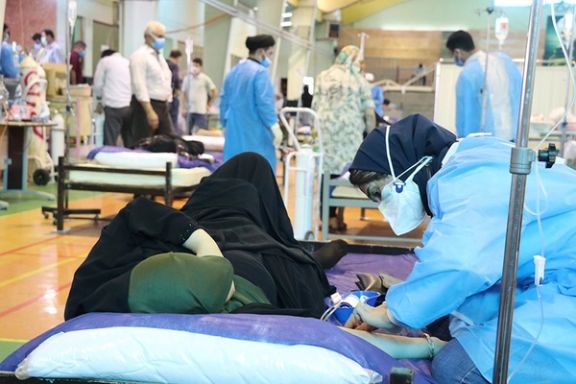
Iran will reportedly receive $90 million from the World Bank for measures to fight the Covid-19 pandemic, a spokesperson for the organization has said.

Iran will reportedly receive $90 million from the World Bank for measures to fight the Covid-19 pandemic, a spokesperson for the organization has said.
The World Bank approved the aid on December 21 because Iran is "the epicenter of Covid-19 infections in the region" and mitigating “the ongoing humanitarian crisis in the country” would reduce the contagion of the disease beyond its borders that benefits the neighbors, particularly as the Omicron variant is causing a new wave of cases.
The spokesperson told AFP that the loan "will be utilized only for procuring additional lifesaving, essential medical equipment to strengthen Iran's pandemic response", emphasizing that "This funding will not go to the Iranian budget and all loan proceeds, as well as procurement and disbursements, are being managed by the World Health Organization”.
“Distribution and installation of equipment will take place at health facilities approved by the World Bank and will be subject to independent monitoring and verification," added the spokesperson.
In May 2020, the World Bank granted Tehran $50 million via the Iran Covid-19 Emergency Response Project "on an exceptional basis" due to the pandemic.
Iran, which confirmed the first Omicron case on December 19, is the worst hit countries in the Middle East by more than 132,000 deaths since February 2020.

Families of victims who died when Iran shot down an airliner in 2020 gathered at Tehran's Imam Khomeini Airport and the crash site Saturday to demand justice.
Families who last year had gathered at the airport on the first anniversary of the tragedy that claimed the lives of all 176 onboard carried photos of their loved ones and posters that read "Compensation Can Never Replace Justice".
Iran’s government announced in December 2020 that all victims would receive the $150,000 compensation but many families have refused to take the money and insist they just want punishment for those responsible for the death of their loved ones.
"Our hearts are still bleeding after two years remembering that night …The truth must come out, it shouldn't be sacrificed to suit the expedience [of politicians]. We insist on truth and justice," the father of one of the victims is seen saying in a speech in a video posted on Twitter.
Victims' families then chanted "Truth, Justice", a slogan that also appeared on their posters.
"Why did you fire missiles at our children? Why did they kill them? Why did they hide the truth about what they had done?" another video shows him saying in his speech while insisting that victims' families wanted the truth to be revealed and those responsible for the order to fire missiles at the airliner be punished, not compensation.
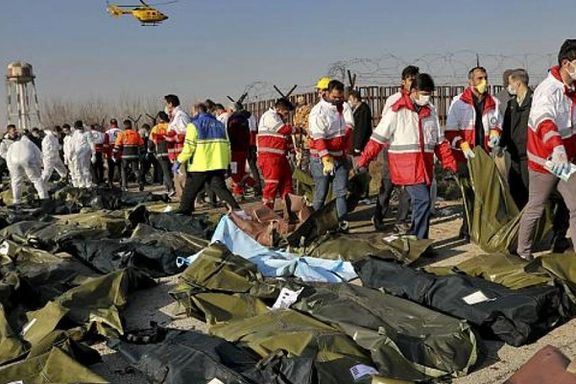
Families later went to the crash site in Shahed Shahr in the southwest of the capital where they were joined by locals who chanted "Truth, Justice" as a helicopter, apparently belonging to security forces, flew overhead.
Ukraine's flight PS752 was shot down by two air-defense missiles fired by Iran’s Revolutionary Guard (IRGC) in the morning of January 8, 2020, as it took off from Tehran’s Imam Khomeini International Airport.
Despite expecting retaliation for IRGC missiles fired at bases in Iraq hosting US troops only hours earlier and expecting a retaliation, the IRGC which is responsible for air defense of the capital did not close the civilian airspace in the early morning hours of 8 January.
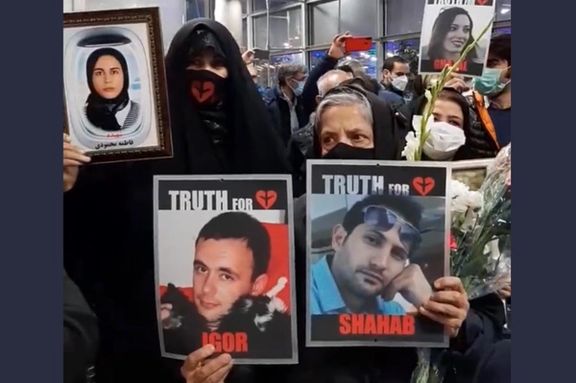
For three day the authorities claimed they knew nothing of the real cause of the crash but after an amateur video emerged on social media that showed missiles were fired at the plane, Iran had to admit the military had shot down the plane by “human error”.
Tehran has not allowed an independent investigation or provided full answers to questions by other countries, including Ukraine. The trial of ten low-ranking military personnel began in November. Many among victims' families objected to the trial demanding "the real culprits" to be held accountable.
In May 2021, an association representing the families of victims announced on social media that some families had received an electronic message from the military prosecutor handling the case informing them that high-ranking officials cannot be prosecuted.
Tens of victims were Canadian citizens or lived in Canada where their families gathered at one of the victim's home Friday evening in Toronto.
A spokesperson for Global Affairs Canada in a statement Friday called the downing of the Ukrainian airliner a "Canadian tragedy" and said they "remain committed to seeking answers and pursuing justice".
Canadian Prime Minister Justin Trudeau met virtually with the families on Friday. "Our government will not rest in our fight for justice and accountability," he tweeted after the meeting.
Meanwhile, Iran's security forces Saturday arrested a civil rights activist, Yashar Tabrizi, soon after he posted a video of himself remembering the victims at the crash site near Tehran. In the video Tabrizi, a taxi driver, said he had gone there with his family to light a remembrance candle and to demand those responsible to be put on trial.
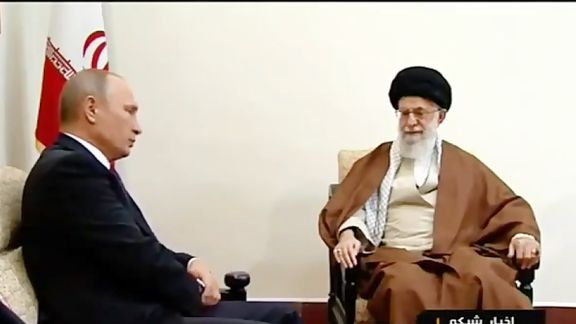
Iranian President Ebrahim Raisi’s upcoming January visit to Russia is perceived both as an opportunity and as a moment of sober calculations in Tehran.
A January 4 report the Iranian Labor News Agency ILNA said that the two countries will discuss an agreement in defense, which includes purchasing tens of military aircraft for Iran. Iranian pilots have been undergoing training to fly Sukhoi jets, ILNA reported. According to ILNA, Iran might also try to purchase the Russian S-400 air defense systems.
Russia, a participant in the Joint Comprehensive Plan of Action (JCPAO), and a key player in the current Vienna negotiations to restore the agreement is seen as the Islamic Republic’s diplomatic backer. However, some Iranian media and social media users have harshly criticized Russian envoy Mikhail Ulyanov's accentuated role in the talks saying that he has sometimes behaved in a way as if he was speaking for Iran. Others have accused him of dictating his ideas to the Iranian team.
Meanwhile, a video of Iran's chief negotiator Ali Bagheri-Kani speaking after a meeting with Russian Deputy Foreign Minister Sergei Ryabkov in Moscow has gone viral on social media. In the video, Bagheri tells Ulyanov: "We are seriously counting on you.” Also, going viral on social media is a photo showing Ulyanov in a meeting with US Special Representative for Iran Robert Malley, as if the two world powers are deciding the fate of the talks.
The Iranian opposition sees Raisi's trip as part of the Islamic Republic's determined policy to rely on Russia and China to avoid better relations with the West, to the detriment of Iran's national interests.
In a commentary on the moderate news website Rouydad24, Seyyed Mahmoud Sadri, a former Iranian ambassador to Cuba, wrote, "Raisi's visit to Moscow is a significant event, however, he should be aware that this is a complicated political move. Both sides at this meeting should try to win the other side's confidence and provide a baseline for solid relations in the future."
"What makes this visit important is Russia's geopolitical situation and its industrial and military potentials as well as its membership at the UN Security Council," Sadri said, mindless of the fact that in early 2010s Russia at times voted against Iran at the Security Council.
However, Sadri noted that Iran should also remember some bitter episodes between Tehran and Moscow including broken promises and quite a few wars in the past two centuries. However, he did not elaborate on Moscow's broken promises. But he pointed out that both under Communism and in the post-Communist period, Russia has benefitted from Iran much in the relationship. As an example, he mentioned the way Russia has benefitted from Iran's military support in Syria while it has given more concessions to Turkey and Israel.
Sadri warned that Iran's "Looking East" policy cannot serve the country's national interests without trying to reduce tensions with the West at the same time. Also, Iran should be aware that ties with the West are always important for Moscow.
Last Autumn, the Chief of Staff of the Iranian armed forces Mohammad Bagheri claimed that Iran has received advanced military equipment from Russia, but although Iran is keen to display its military capabilities, nothing in this regard has been showcased so far.
Bagheri has said, "Ties between Tehran and Moscow are strong enough, but the two sides are still far from building a military bloc."
Iran expects to get 59 Sukhoi and other military aircraft from Russia as well as overhauling its old MIG and Sukhoi jets. However, these might be more feasible than Iran's demand for the S-400 system which Russia has agreed with Israel not to sell to "untrustworthy" countries.
On the other hand, even if Iran prioritizes its military needs over improving its citizens' livelihood, it might not be able to pay for what it wishes to purchase from Russia as a result of US sanctions on its international banking.
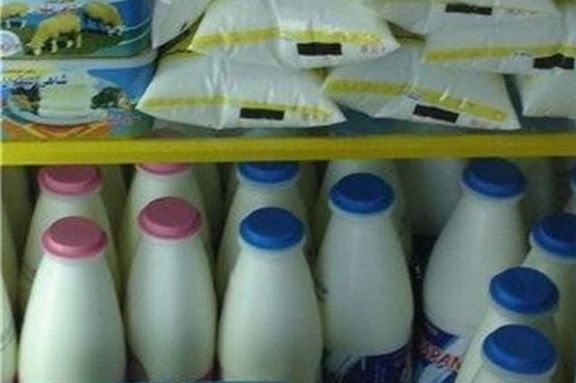
Iran’s health ministry has announced that the average consumption of milk and dairy products has decreased about 30 percent in the last two years.
The director of the ministry’s nutrition department, Zahra Abdollahi, said on Friday that the rise in food prices and inflationare the main reasons that have made people consume less milk products.
She noted that the country’s average consumption has always been under the recommended amount but the economic consequences of the Covid-19 pandemic and inflation have contributed to the sharp decline.
Abdollahi added that such low consumption of dairy products -- and consequently less calcium and phosphorus -- can cause serious health issues among people, particularly in children.
She stressed that currently osteoporosis is one of the leading diseases in Iran, warning that such a low consumption of dairy products can further increase such problems in the coming years.
Mentioning some reports that predict a 60-percent rise in the price of milk products in the coming months, she urged the authorities to consider subsidies and plans for free-of-charge milk for students.
The Iranian government has cut the subsidy on milk, which resulted in higher prices for dairy products, while free-of-charge milk is no longer distributed in elementary schools.
Despite having the biggest dairy products factory in the Middle East, Iran has a per capita consumption of about 60 to 80 kilograms a year, that is about half of the global average.
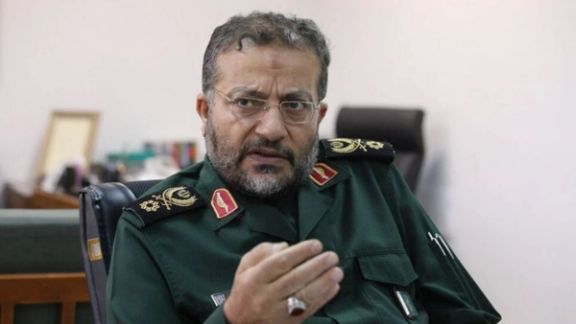
Iran's Revolutionary Guard (IRGC) has announced plans to set up Basij paramilitary bases in about 11,000 neighborhoods across the country by March 2023.
The head of the Basij Organization, under the command of the IRGC, said that there are 50,000 neighborhoods in the country, therefore when the plan – dubbed Islamic neighborhoods – is implemented, Basij will have active presence in about one-fifth of the neighborhoods all over Iran.
The move is a measure to strengthen internal security in the country, by establishing control over residents in these neighborhoods.
Brig. Gen. Gholamreza Soleimani commander of the Basij made the remarks during a Thursday meeting in Shahrekord, where a memorial statue of Qasem Soleimani, the commander of Iran’s Qods Force, was set on fire on Wednesday.
Soleimani added that the neighborhood patrols scheme has been carried out in about 800 locations so far, and Basij is ready to provide support for all the mosques that would join the project.
The Basij commander was sanctioned by the US and the Council of Euopre in 2021 for his role in the violent crackdown during the bloody November 2019 protests.
The Basij is a paramilitary force of mostly young volunteers, who receive benefits. Its members usually go through limited training to serve as an auxiliary force in local security and enforcing state control over society through suppressing demonstrations and gathering intelligence.

Iran has condemned four countries who announced Thursday they would take action against Tehran over compensation for the downing of a Ukrainian plane in 2020.
Iran’s foreign ministry issued a statement Friday accusing Canada, Sweden, the United Kingdom and Ukraine of “mis-using this incident,” saying it will only negotiate with each country separately.
The four countries with the greatest number of victims on the Ukrainian International Airlines flight shot down over Tehran have formed the International Coordination and Response Group to support families of victims of flight PS752.
On Thursday, the four countries in a joint statement said they had abandoned efforts to talk to Iran about reparations and would try to settle the matter according to international law.
"Despite our best efforts over the past two years and multiple attempts to resolve this matter through negotiations, the Coordination Group has determined that further attempts to negotiate with Iran ... are futile," the statement said.
Flight PS752 was shot down by two air-defense missiles fired by Iran’s Revolutionary Guard (IRGC) in the morning of January 8, 2020, as it took off from Tehran’s Imam Khomeini International Airport. All 176 people on board were killed.
Just hours earlier Iran had fired ballistic missiles at bases in Iraq hosting US troops and was expecting a retaliation, but it failed to close the civilian airspace. After the tragic incident, the government tried to hide the true cause for three days, but after amateur video footage emerged showing the plane exploding it admitted that the military was responsible but said that a “human error” had taken place,
Tehran never allowed an independent investigation or provide full answers to questions by other countries, such as Ukraine. Eventually it put ten lower-ranking military personnel on trial, while victims’ families demanded investigation of senior government officials in charge.
In the Friday statement Iran’s foreign ministry emphasized on sovereignty of states over air disaster incidents on their territory, more of an argument Tehran has used not to provide answers, such as who in the command chain issued orders that day. It has also argued that a “radar misalignment” caused the incident but that begs the question of why two missiles were fired 30 seconds apart.
The statement also said that Iran is ready to pay reparations to the families of thirty foreign nationals. The amount Iran has decided to pay is $150,000 per victim. Mentioning 30 victims means that Iran does not want to recognize those who were dual national residents of Canada or Sweden as automatically eligible for the $150,000 compensation.
Iran’s government announced in December 2020 that all victims would receive the $150,000 compensation, but a year later, it said that it has paid just a few families.
In countries with independent courts families of victims can pursue legal avenues to receive compensation or demand accountability in such an incident, but in Iran courts and prosecutors are all part of the Judiciary controlled by the Supreme Leader Ali Khamenei.
A Canadian court just recently awarded C$107 million ($84 million) to the families of six people who had sued Iran. More court cases are pending in Canada.
In May 2021, an association representing the families of victims announced on social media that some families have received an electronic message from the military prosecutor handling the case informing them that high-ranking officials cannot be prosecuted.